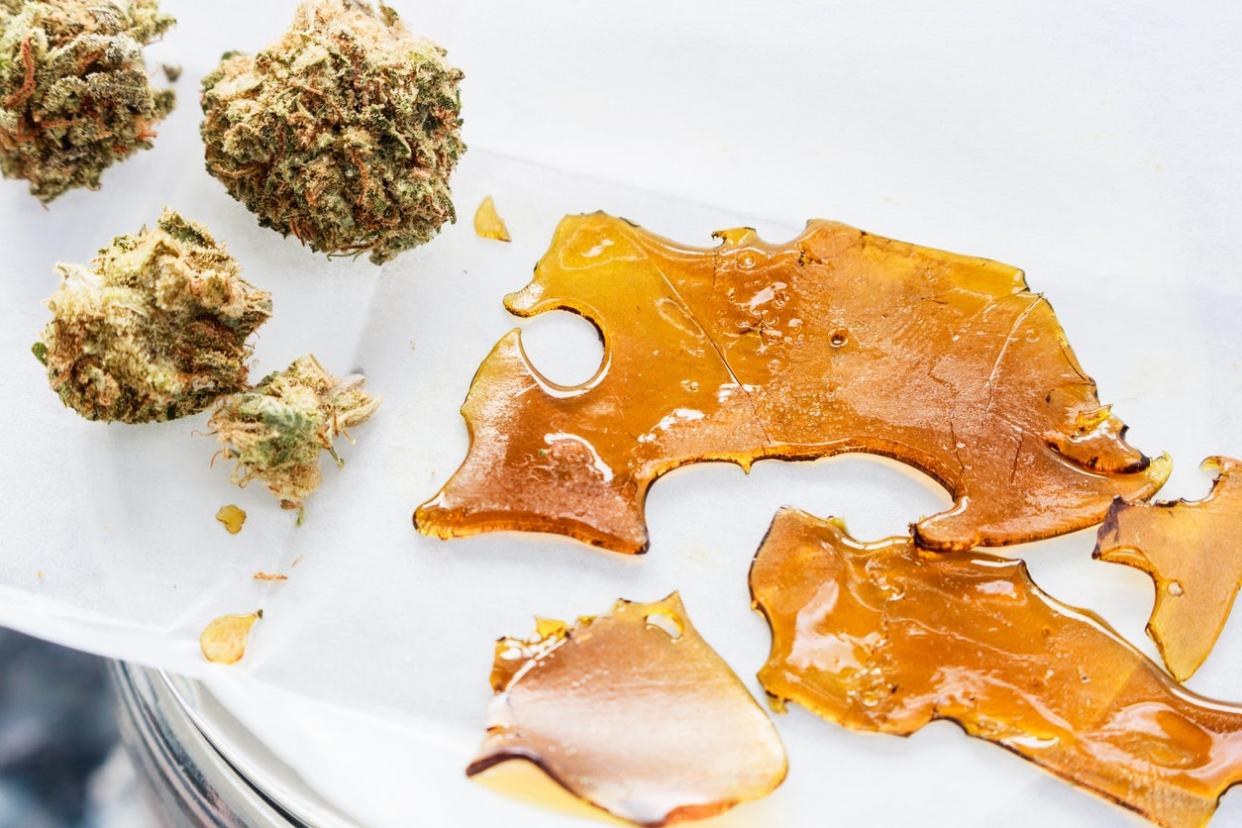Seven killed in large-scale California ‘honey oil’ cannabis operation

The sleepy town of Aguanga, southern California, was rocked by seven drug-related killings at a Marijuana farm where detectives recovered 1,000 pounds of cannabis, large amounts of which had been processed into "honey oil", a highly potent concentrate made by extracting the THC chemical from the plant.
Riverside County Sheriff’s Department said in a statement that police responded to reports of an assault with a deadly weapon at property on the outskirts of the town, which has just 2,000 residents, at around 12.30am on Monday.
On arrival, officers found six people shot dead at the residence, which is thought to have housed 20 people and had a built-in nursery. A woman was found suffering from bullet wounds and was taken to hospital where she later died, Riverside County Sheriff Chad Bianco said. All seven victims and witnesses were from Laos, a small Asian country bordering Thailand.
"This was not a small operation," Bianco said. "This is a very organized-crime type of an operation."
"Honey" or hash oil can extracted through a variety of methods, with the most common involving a solvent, such as butane or ethanol. It isusually consumed by smoking, vaping or eating and coloured transparent gold, light brown, tan or black.
According to the Healthline, the use of honey oil is often referred to as "dabbing" or "burning". Users also somestimes rub the substance into their skin. Honey oil is more potent than smoking regular cannabis because it contains more THC, the active ingreident that gets users high.
Illegal grows are though to be common occurence in Aguanga. But the scale of the Labor Day massacre stunned residents and showed how violence permeates California's illegal marijuana market.
The state broadly legalized recreational marijuana sales in January 2018. But the illicit market is thriving — in part because hefty legal marijuana taxes send consumers looking for better deals in the illegal economy.
Despite there being no arrests or identified suspects, the sheriff's statement called the deaths "an isolated incident" that did not threaten people in Aguanga.
Partially eaten pizza sat in boxes in a circular dirt driveway of the dilapidated two-bedroom house where the shootings occurred. Three cars were parked outside — one with its front doors open.
Cases of bottled water were stacked on the front porch, which was strewn with clothing and plastic bags. A black tarp was stretched atop poles in the fenced backyard, indicating a small growing operation. Unlike many neighboring homes, it had neither a gate nor a "no trespassing" sign at the entrance.
Reached by phone, property owner Ronald McKay expressed surprise, saying he didn't know a shooting had taken place at either of the rentals, a mobile home and the house.
He said he had tried to visit Monday to check on the well during the recent heat wave, but he was turned away by a deputy who wouldn't tell him what was going on. He said he left his phone number, but authorities never called.
McKay said he didn't know the tenants or their names — the rentals are handled by someone who works with him. But he said the home had been rented for three years and the mobile home for two without incident.
"I'm kind of unaware of anything right now," McKay said. "For two and three years, they've been there — perfect. Never had an issue."
Aguanga, with its post office, general store and real estate brokerage, is in an area dotted with vineyards and horse ranches that have given it some traction as a weekend getaway for Southern California residents. It's near Temecula, a bedroom community for San Diego and Los Angeles.
Deputies in February seized more than 9,900 plants and collected 411 pounds (186 kilograms) of processed marijuana and firearms from suspected illegal marijuana sites in the Aguanga area. Four people were arrested.
Law enforcement surveillance in the area has spawned nicknames like "Marijuana Mondays," "Weed Wednesdays" and "THC Thursdays," said Mike Reed, a real estate broker and 28-year Aguanga resident.
Reed said he does real-estate business with pot growers — some of whom live in his gated community.
Residents move to Aguanga for "peace and solitude," Reed said. "People live here because it's not in the city."
Aguanga's isolation, however, may have made it prone to illegal marijuana sales and cultivation. The sheriff said almost every marijuana operation in the mountainous communities is illegal.
Adam Spiker, executive director of the Southern California Coalition, a cannabis industry group, said the shootings were a reminder that the sprawling illegal marketplace remains largely unchecked.
"Shame on all of us: It seems we have one foot in and one foot out on regulating this industry," Spiker said.
Many California communities have not established legal marijuana markets or have banned commercial marijuana activity. Law enforcement has been unable to keep up with the illicit growing operations.
"This risk is inherent in the underground market," said Los Angeles marijuana dispensary owner Jerred Kiloh, who heads United Cannabis Business Association, an industry group. "When you have money and high returns, people want to take that from you."
Kiloh said most illicit market crimes go unreported because farmers who have been robbed cannot turn to authorities.
Laotian involvement in illegal marijuana harvesting has grown over the last decade in California's agricultural heartland. People from the relatively small community account for much of the pot growing in backyards and on prime farmland.
Large cannabis growing operations typically have hundreds of thousands of dollars of product at each site, making them attractive targets for criminals.
"That's why the violence becomes worse and worse," Kiloh said.
Additional reporting by Associated Press
Read more

